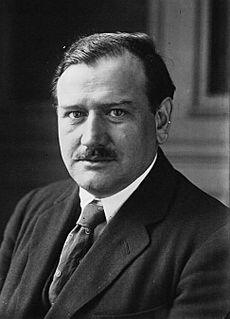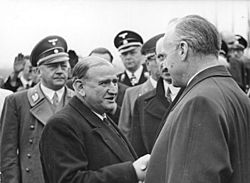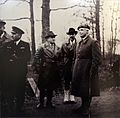Édouard Daladier facts for kids
Quick facts for kids
Édouard Daladier
|
|
|---|---|
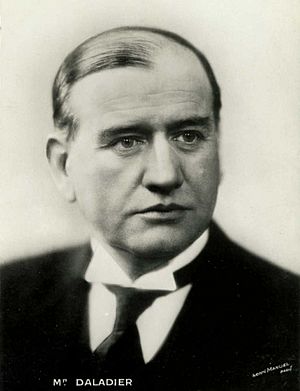
Daladier in the 1930s
|
|
| Prime Minister of France | |
| In office 10 April 1938 – 21 March 1940 |
|
| President | Albert Lebrun |
| Preceded by | Léon Blum |
| Succeeded by | Paul Reynaud |
| In office 30 January 1934 – 9 February 1934 |
|
| President | Albert Lebrun |
| Preceded by | Camille Chautemps |
| Succeeded by | Gaston Doumergue |
| In office 31 January 1933 – 26 October 1933 |
|
| President | Albert Lebrun |
| Preceded by | Joseph Paul-Boncour |
| Succeeded by | Albert Sarraut |
| Minister of Defence | |
| In office 4 June 1936 – 18 May 1940 |
|
| Prime Minister | Léon Blum Camille Chautemps Himself |
| Preceded by | Louis Maurin |
| Succeeded by | Paul Reynaud |
| In office 18 December 1932 – 29 January 1934 |
|
| Prime Minister | Joseph Paul-Boncour Himself |
| Preceded by | Joseph Paul-Boncour |
| Succeeded by | Jean Fabry |
| Member of the Chamber of Deputies | |
| In office 2 June 1946 – 8 December 1958 |
|
| Constituency | Vaucluse |
| In office 16 November 1919 – 10 July 1940 |
|
| Constituency | Vaucluse |
| Personal details | |
| Born | 18 June 1884 Carpentras, Vaucluse, France |
| Died | 10 October 1970 (aged 86) Paris, France |
| Political party | Radical-Socialist |
| Spouses |
Madeleine Laffont
(m. 1917; Jeanne Boucoiran
(m. 1951) |
| Children | Jean Pierre Marie |
| Education | Collège-lycée Ampère |
| Profession | Historian, teacher |
| Signature |  |
| Military service | |
| Allegiance | |
| Branch/service | |
| Years of service | 1914–1919 1945 |
| Rank | Captain |
| Battles/wars | World War I |
Édouard Daladier (born June 18, 1884 – died October 10, 1970) was an important French politician from the Radical-Socialist group. He served as the Prime Minister of France several times. He is most known for signing the Munich Agreement in 1938, which happened just before World War II started.
Daladier was born in Carpentras, France. He began his political career before World War I. During the war, he fought bravely on the Western Front and received awards for his service. After the war, he became a key leader in the Radical Party. He was Prime Minister in 1933 and 1934. He also served as Minister of Defence from 1936 to 1940. He became Prime Minister again in 1938. During this time, he helped expand France's social support system.
In 1938, Daladier, along with Neville Chamberlain (British Prime Minister), Benito Mussolini (Italian leader), and Adolf Hitler (German leader), signed the Munich Agreement. This agreement allowed Nazi Germany to take control of a part of Czechoslovakia called the Sudetenland. After Hitler's invasion of Poland in 1939, Britain and France declared war on Germany.
During a period known as the Phoney War, France did not help Finland when the Soviet Union invaded it in the Winter War. This led to Daladier resigning as Prime Minister on March 21, 1940. He was replaced by Paul Reynaud. Daladier remained Minister of Defence for a short time.
After France was defeated in the Fall of France, Daladier was accused of treason by the Vichy government during a trial called the Riom Trial. He was imprisoned in different places, including Buchenwald concentration camp and Itter Castle. He was freed after the Battle of Castle Itter. After the war, Daladier returned to politics. He served as a member of the French Parliament from 1946 to 1958. He passed away in Paris in 1970.
Contents
Early Life and Military Service
Daladier was born in Carpentras, Vaucluse, on June 18, 1884. His father was a village baker. He went to school in Lyon and became interested in socialist ideas there. After finishing school, he worked as a teacher and university lecturer in cities like Nîmes, Grenoble, Marseille, and Paris. He taught history.
His political career began in 1912 when he became the mayor of his hometown, Carpentras. He later joined the Radical-Socialist Party.
Before World War I, Daladier had military training because of France's conscription system. In August 1914, when the war began, he joined the French Army as a sergeant. In 1915, his regiment faced heavy fighting on the Western Front. Daladier was transferred to another unit. In 1916, he fought in the famous Battle of Verdun. He was promoted to lieutenant during the battle for his bravery. In May 1917, he received the Legion of Honour and the Croix de Guerre for his courage. He finished the war as a captain leading a company.
After the war, in 1919, he was elected to the French Parliament (Chamber of Deputies) for Orange, Vaucluse. People sometimes called him "the bull of Vaucluse" because of his strong appearance.
Between the World Wars
After joining the Parliament, Daladier became a key leader of the Radical-Socialist Party. He helped make it a more organized and modern political party. For much of the time between the two World Wars, he was a main figure in the party's left wing. This group wanted to work with the socialist party (SFIO) to form governments.
Daladier served as a government minister in different roles between 1924 and 1928. In 1933, he became Prime Minister, leading a government of the republican left.
In January 1934, he was seen as the best person to lead a government that could calm public anger after a big corruption scandal called the Stavisky Affair. However, his government lasted less than a week. It fell apart because of large protests and riots on February 6, 1934. After Daladier's government fell, right-wing governments took power for the next two years.
Daladier returned to politics in October 1934. He spoke out against powerful banks, which he believed controlled French democracy. He became the president of the Radical-Socialist Party and brought the party into a group called the Popular Front. Daladier then became the Minister of National Defence in the government led by Léon Blum. He held this important position for two years.
After the Blum government ended, Daladier became Prime Minister again on April 10, 1938. His new government moved towards the political center and ended the Popular Front.
The Munich Agreement
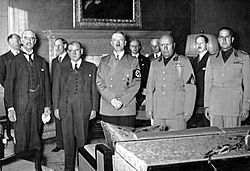
Daladier's last government was in power during the talks that led to the Munich Agreement. In this agreement, France pressured Czechoslovakia to give the Sudetenland region to Nazi Germany. In April and May 1938, British Prime Minister Neville Chamberlain tried hard to convince Daladier to break France's alliance with Czechoslovakia. However, Daladier refused, which meant Britain had to get involved in the crisis.
Daladier understood Hitler's goals better than Chamberlain did. In April 1938, he told the British that Hitler wanted to control all of Europe, making Napoleon's ambitions seem small. Daladier said, "Today, it is the turn of Czechoslovakia. Tomorrow, it will be the turn of Poland and Romania." He warned that if Britain and France gave in again, it would only lead to war faster.
However, Daladier was worried about the French military's readiness and the terrible memories of World War I. He also faced serious economic problems in France. The French currency (franc) had lost value, and the government was running out of money. Investors were afraid to buy French bonds if France went to war. This financial pressure made it harder for Daladier to stand firm.
Reports from other countries showed that France's allies in Eastern Europe, like Yugoslavia and Romania, might not help Czechoslovakia. Poland might even join Germany because of its own conflict with Czechoslovakia. The Soviet Union offered to help Czechoslovakia, but Poland and Romania would not let the Soviet army pass through their lands.
On September 25, 1938, Hitler demanded that the Sudetenland be given to Germany by October 1. Daladier told his government that France "intended to go to war." He ordered the French military to get ready for war and imposed a blackout in cities.
However, on September 29, Chamberlain announced that Mussolini had convinced Hitler to discuss a compromise in Munich. Daladier felt France could not win a war against Germany without Britain's help. So, he also went to the Munich Conference on September 30.
The Munich Agreement was a compromise. Hitler gave up some extreme demands, but Czechoslovakia still had to give the Sudetenland to Germany within ten days. Daladier was glad to avoid war, but he felt the agreement was shameful and a betrayal of Czechoslovakia, France's loyal ally. When he returned to Paris, he expected people to be angry. Instead, crowds cheered him for avoiding war. He famously told his aide, "Ah! The fools! If only they knew..."
Rearmament Efforts
Daladier knew about Germany's military preparations. In October 1938, he started secret talks with the Americans. He wanted to find a way for France to buy American aircraft, as France's own aircraft industry was not producing enough. Daladier said, "If I had three or four thousand aircraft, Munich would never have happened."
France had financial problems, including old debts from World War I. This made it difficult to get loans from the US. After long talks, an agreement was made in spring 1939 for France to buy many American planes. Most of these planes did not arrive in France before 1940.
In October 1938, Daladier announced a new policy: "Forward with France!" This meant ending some social reforms from the Popular Front government to increase French production, especially by ending the 40-hour work week. New laws increased taxes, cut social spending, and increased defense spending. The power of unions was also limited. These changes were meant to prepare France for war.
A general strike was called on November 30, 1938, to protest these changes. Daladier declared a national emergency, sent the military to cities, and said striking workers would be fired. The strike quickly ended. Daladier believed these tough measures were necessary for France to face Germany.
At the same time, the Colonial Minister, Georges Mandel, worked to prepare the French Colonial Empire for war. He built weapons factories, increased the number of colonial troops, and built defenses in Tunisia. He also started a campaign to show how the colonies made France stronger.
Daladier's government also made some social improvements. A more generous system of family allowances was created, giving money to families based on the number of children. A new allowance was also created for mothers who stayed home to care for their children.
In late 1938, Italy, led by Mussolini, demanded that France give up territories like Tunisia and Corsica. Daladier completely rejected these demands. He warned that France would go to war to defend its land.
In early 1939, Daladier allowed French intelligence to spread false rumors that Germany was about to invade the Netherlands. This was done to make Britain worried and encourage them to commit to helping France if a war broke out. On February 6, 1939, British Prime Minister Chamberlain announced that Britain would help France if its vital interests were threatened. This led to military talks between Britain and France.
Daladier supported the idea of a "peace front" to stop Germany, but he was not happy with Britain's promise to defend Poland. France had been allied with Poland since 1921, but Daladier found the Polish government unreliable. By September 1939, France's aircraft production had improved, and American planes were starting to arrive.
Daladier was more eager than Chamberlain to include the Soviet Union in the "peace front." He believed an alliance with the Soviets was the best way to stop Hitler from invading Eastern Europe. However, Poland refused to let the Soviet army pass through its territory, which was a condition for the Soviets to join. Daladier felt that Britain should not have promised to defend Poland until Poland agreed to let the Soviet army pass.
On August 23, 1939, Germany and the Soviet Union signed the Molotov–Ribbentrop Pact, which was a non-aggression agreement. This ruined Daladier's hopes for a "peace front" with the Soviets. However, he still believed France and Britain could stop Germany together. On August 27, 1939, Daladier told the US Ambassador that France would stand by Poland, and if Hitler attacked Poland, France would fight immediately.
World War II
After the Molotov–Ribbentrop Pact was signed, Daladier outlawed the French Communist Party because it refused to condemn the Soviet Union's actions. When Germany invaded Poland on September 1, 1939, Daladier reluctantly declared war on September 3. This began the period known as the Phoney War.
On October 6, Hitler offered peace to France and Britain. While some in the French government considered it, Daladier declared that France would not lay down its arms until there were guarantees for a real and lasting peace. On January 29, 1940, Daladier stated in a radio address that the war was about saving liberty and human dignity from the "world of masters and slaves" that the Nazis wanted to create.
In March 1940, Daladier resigned as Prime Minister because he failed to help Finland during the Winter War. He was replaced by Paul Reynaud. However, Daladier remained Minister of Defence. After the massive German breakthrough at Sedan, Daladier became Foreign Minister, and Reynaud took over as Defence Minister.
After the Fall of France, Daladier believed the French government would continue fighting from North Africa. He fled to French Morocco with other government members. However, he was arrested and put on trial for treason by the Vichy government during the Riom Trial.
Daladier was imprisoned from 1940 to April 1943. He was then handed over to the Germans and sent to Buchenwald concentration camp in Germany. In May 1943, he was moved to Itter Castle in Austria, where he stayed until the end of the war. He was freed after the Battle of Castle Itter.
After the War
After World War II ended, Daladier was re-elected to the French Parliament in 1946. He supported a younger leader in his party, Pierre Mendès-France. He also became the Mayor of Avignon in 1953.
He opposed the transfer of power to Charles de Gaulle after the May 1958 crisis. However, he failed to be re-elected in the legislative elections that year. After nearly 50 years in politics, he retired at the age of 74.
Death
Édouard Daladier died in Paris on October 10, 1970, at the age of 86. He was buried in the Père Lachaise Cemetery in Paris.
In Visual Media
- Daladier has been played by actors in movies:
- The English actor David Swift played him in Countdown to War (1989).
- French actor Stéphane Boucher played him in Munich – The Edge of War (2021).
- The Czech comedy Lost in Munich (2015) is about a 90-year-old parrot who used to live with Daladier and still repeats his quotes about the Munich Agreement.
Images for kids
-
Édouard Daladier (right) with ambassador André François-Poncet at the Munich Agreement in 1938.
See also
 In Spanish: Édouard Daladier para niños
In Spanish: Édouard Daladier para niños
- Interwar France
- French Third Republic
- 6 February 1934 crisis
 | John T. Biggers |
 | Thomas Blackshear |
 | Mark Bradford |
 | Beverly Buchanan |


